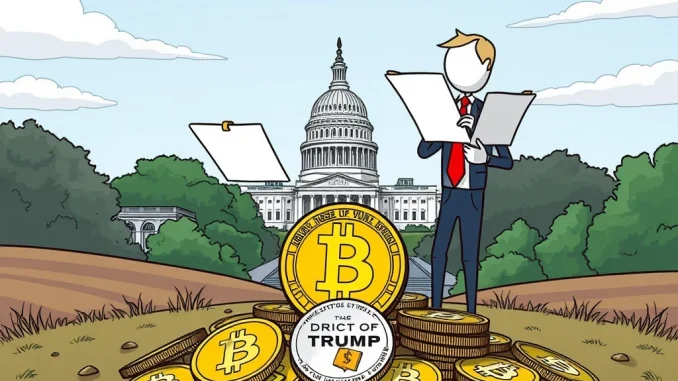
A political storm is brewing at the intersection of Washington D.C. and the cryptocurrency market. U.S. Senator Chris Murphy has thrown a legislative gauntlet, introducing a bill specifically aimed at preventing government officials from leveraging their position for personal financial gain in assets like cryptocurrencies. This move directly targets figures like former President Donald Trump, particularly in light of his association with the TRUMP meme coin.
What is Senator Chris Murphy’s MEME Act?
Senator Chris Murphy, a Democrat from Connecticut, is the driving force behind the newly proposed MEME Act. This isn’t just a catchy name; it stands for something significant in the realm of political ethics and financial transparency. The bill is designed with a clear purpose: to create a legal barrier preventing U.S. officials from engaging in self-dealing, especially when it comes to investments where their public actions or endorsements could directly impact value.
The core idea is simple but powerful: those in positions of public trust should not use that trust to line their own pockets through market speculation or promotion of assets they hold. The MEME Act specifically calls out various forms of investments, including:
- Cryptocurrencies
- Securities
- Other financial instruments where conflicts of interest could arise
Senator Murphy’s motivation stems from concerns that the current rules aren’t sufficient to address the rapidly evolving landscape of digital assets and their potential for abuse by public figures.
Why is Donald Trump Targeted by This Bill?
While the MEME Act applies broadly to U.S. officials, Senator Murphy explicitly mentioned Donald Trump as a prime example of the behavior the bill seeks to curb. Trump’s name and image have become associated with several digital assets, most notably the TRUMP meme coin (often referred to by its ticker, MAGA or TRUMP).
The concern highlighted by Senator Murphy is that any promotion or even perceived endorsement of such an asset by a prominent political figure, especially one who has held or may again hold high office, constitutes a blatant conflict of interest. It raises questions about whether actions or statements are made in the public’s interest or for personal financial benefit related to the value of the meme coin or other associated assets.
This isn’t just theoretical; the value of these meme coins can be highly volatile and sensitive to public sentiment and endorsements, making them particularly susceptible to manipulation or undue influence if promoted by powerful figures.
The TRUMP Meme Coin and Ethical Concerns
The emergence and popularity of political-themed meme coins, like the TRUMP meme coin, add a new layer of complexity to the debate around official ethics. Meme coins are often created with little underlying utility and rely heavily on community hype, social media trends, and endorsements from figures they are associated with.
For a political figure to be linked to or, worse, appear to promote such an asset raises several ethical red flags:
- Conflict of Interest: Public officials have a duty to act in the public’s best interest, not their own financial gain. Promoting a personal investment directly conflicts with this duty.
- Market Integrity: Endorsements from high-profile officials can artificially inflate asset values, potentially harming less informed investors who buy in based on hype rather than fundamentals.
- Undermining Trust: Such actions erode public trust in government and its officials, suggesting decisions might be influenced by personal wealth rather than policy goals.
Senator Murphy’s bill directly addresses this, aiming to draw a clear line that officials cannot cross when it comes to assets tied to their personal brand or financial interests.
The Broader Context: Crypto Regulation and Politics
The introduction of the MEME Act occurs within a period of intense focus on crypto regulation in the United States. Lawmakers across the political spectrum are grappling with how to oversee the digital asset space, addressing issues like investor protection, market stability, and illicit finance.
The debate over crypto regulation is complex, involving multiple government agencies and competing legislative proposals. Some key aspects include:
- Determining which cryptocurrencies are securities and fall under SEC purview.
- Establishing rules for crypto exchanges and custodians.
- Addressing the use of crypto in illicit activities.
- Considering the role of stablecoins and CBDCs.
Against this backdrop, Senator Murphy’s bill highlights a specific ethical dimension of the crypto debate: how officials involved in shaping this new regulatory landscape should handle their own potential financial interests in the market. The bill suggests that as lawmakers advance crypto regulation, they must also address the ethical hygiene of the regulators and legislators themselves.
Why This Matters for U.S. Officials and the Public
The MEME Act, if passed, would establish a new standard of conduct for U.S. officials regarding their personal investments in potentially conflicted assets like meme coins and other cryptocurrencies. This isn’t just about preventing direct promotion; it’s about preventing the appearance of impropriety and ensuring that public service is not viewed as an opportunity for personal enrichment through market influence.
For the public, this bill is about transparency and accountability. It seeks to reassure citizens that their elected representatives and appointed officials are making decisions based on sound policy and public good, not on the potential impact to their personal investment portfolios. As the crypto market becomes more mainstream, the need for clear ethical guidelines for officials interacting with this space becomes increasingly important.
Conclusion: Setting Ethical Boundaries in the Digital Age
Senator Chris Murphy’s introduction of the MEME Act represents a significant step in the ongoing effort to define ethical boundaries for U.S. officials in the age of digital assets. By specifically targeting the promotion of personal financial interests like the TRUMP meme coin, the bill brings a high-profile example of potential conflict directly into the legislative spotlight. As the debate around crypto regulation continues to evolve, legislation like the MEME Act underscores the critical need for robust rules to ensure public trust and prevent corruption at the intersection of politics and personal finance.



